Evaluation of the Vocational Rehabilitation Project - National Cancer ...
Evaluation of the Vocational Rehabilitation Project - National Cancer ...
Evaluation of the Vocational Rehabilitation Project - National Cancer ...
You also want an ePaper? Increase the reach of your titles
YUMPU automatically turns print PDFs into web optimized ePapers that Google loves.
Level 1: Open access to informationand supportLevel 3: Specialist vocationalrehabilitationLevel 2: Active support for selfmanagementTable I: The recipients <strong>of</strong> services, service providers and interventions associated with <strong>the</strong>three levels <strong>of</strong> cancer work support and vocational rehabilitation.Recipients Service providers InterventionsEveryone with a cancerdiagnosis who isemployed or who has <strong>the</strong>potential to be employed.All healthcarepr<strong>of</strong>essionals with whom<strong>the</strong> person with cancercomes into contact egClinical Nurse Specialists(CNSs), GPs, oncologistsPositive messages about work. Manypeople at this level will not identifyany difficulties and might not thinkthat <strong>the</strong>y have problems – whichmay well be <strong>the</strong> case – but it isimportant to ensure that workremains on <strong>the</strong> agenda in a positiveway.Signposting and information about(i) <strong>the</strong> impact <strong>of</strong> a cancer diagnosison work, (ii) self managementsupport programmes or o<strong>the</strong>r types<strong>of</strong> available support, and (iii) how toget in touch with o<strong>the</strong>r pr<strong>of</strong>essionalsif <strong>the</strong>y have any concerns.People who have specificquestions, concerns orworries, who, with <strong>the</strong>right information andsupport, will be able toresolve <strong>the</strong>se issues<strong>the</strong>mselves (i.e., who areable to self-manage).Allied Health Care (AHP)pr<strong>of</strong>essionals and o<strong>the</strong>rpr<strong>of</strong>essional groups withsome specialistknowledge <strong>of</strong> <strong>the</strong> impact<strong>of</strong> cancer on work, e.g.<strong>Cancer</strong> informationcentre staff. Macmillan<strong>National</strong> Helpline,Welfare and benefitsadvisers, vocationalrehabilitation specialists,Disability EmploymentAdvisers. Jobcentre Plusstaff,Provision <strong>of</strong> specialised, tailoredinformation, advice or support whichservice users are able to takeforward and implement <strong>the</strong>mselves.Signposting to o<strong>the</strong>r specialistservices and organisations.Service users have face-to-face,phone or e-mail contact withpr<strong>of</strong>essionals. Contact is typically <strong>of</strong>short duration.People who havecomplex problems thatrequire specialist helpfrom qualifiedpr<strong>of</strong>essionals.<strong>Vocational</strong> rehabilitationspecialists (with <strong>the</strong>knowledge and skills setout in <strong>the</strong> competencyframework).Specialist vocational rehabilitationinterventions, including (but not limitedto):Detailed assessment <strong>of</strong> <strong>the</strong> personand <strong>the</strong>ir work situation.Ergonomic assessment.Information and advice on legalrights and responsibilities.Liaison with employers.Modifications to <strong>the</strong> workenvironment.Teaching strategies for managingfatigue, mobility problems, andcognitive problems.5
4.2 Positive messagesGiving people with cancer positive messages about work is a crucial aspect <strong>of</strong> work support.Positive messages are not <strong>the</strong> same thing as screening questions (such as, “Is your diagnosislikely to cause you any work-related problems?”) and information-giving (for example, “TheEquality Act applies to people with cancer.”). Ra<strong>the</strong>r, a positive attitude to employmentshould be embedded in health pr<strong>of</strong>essionals’ verbal and non-verbal interactions withpatients. They should communicate <strong>the</strong> importance <strong>of</strong> work, while at <strong>the</strong> same timerecognising that patients have competing priorities, for example, dealing with <strong>the</strong> physicaland psychological impact <strong>of</strong> <strong>the</strong> diagnosis and treatment.A balance needs to be struck between enabling adequate time and space for rest andrecovery, and keeping work on <strong>the</strong> agenda in way that is encouraging and constructive. Weknow from o<strong>the</strong>r conditions, for example, that early contact with employers promotessuccessful return to work, and that health care pr<strong>of</strong>essionals have a crucial role infacilitating this. 3,4,5 Interviews with <strong>the</strong> pilot sites’ vocational rehabilitation specialistssuggests that this kind <strong>of</strong> support is not routinely provided to cancer patients.We need to look at <strong>the</strong> messages that patients are getting. Their doctor is saying to <strong>the</strong>m, “Just enjoyyour time at home.” I was explaining to a lung CNS recently that she could refer patients to me and shesaid, “Oh no, my patients are still having treatment, it wouldn’t be suitable to talk about work.” So by <strong>the</strong>time some <strong>of</strong> <strong>the</strong> patients come to us, everything’s mounting up, <strong>the</strong>y’re at risk <strong>of</strong> losing <strong>the</strong>ir job, andpart <strong>of</strong> that is because <strong>the</strong>y’ve been told, “Don’t worry about that now.”– <strong>Vocational</strong> <strong>Rehabilitation</strong> Specialist, Pilot Site 3Health pr<strong>of</strong>essionals need to be trained to think differently. Patients are almost led into a sick role. Oneperson I’m seeing has been <strong>of</strong>f for about a year now. She finished all her treatment three months ago andshe’s doing well but she’s still being told that <strong>the</strong>y don’t feel that she’s ready to go back to work. Well whynot? The trouble is <strong>the</strong> CNS sees it as all-or-nothing. They don’t know about phased returns and <strong>the</strong>support that can be <strong>of</strong>fered.– <strong>Vocational</strong> <strong>Rehabilitation</strong> Specialist, Pilot Site 65 TERMINOLOGY AND DEFINITIONS5.1 Finding <strong>the</strong> most useful labelsThe term vocational rehabilitation is not well understood, and is not widely used byemployers or by <strong>the</strong> general public. 6 In setting up and promoting <strong>the</strong>ir services, <strong>the</strong> NCSIpilot sites encountered difficulties in finding <strong>the</strong> right language, commenting that vocationalrehabilitation “means different things to different people”, is “easy to misinterpret”, and“sounds clinical and <strong>of</strong>f-putting to clients”. However, <strong>the</strong> term does have advantages,particularly in health and social services contexts, where rehabilitation services areaccepted, broadly understood and provided with funding.6
The pilot site service providers found that a distinction needed to be made betweenspecialist interventions for people with complex problems (vocational rehabilitation), andsupport for <strong>the</strong> more ordinary, fairly straightforward issues that people had (work support)eg. in understanding <strong>the</strong>ir rights and negotiating a phased return to work.Several pilot sites introduced <strong>the</strong>ir service as ‘Macmillan Work Support’, finding <strong>the</strong>Macmillan badge to be a useful way <strong>of</strong> establishing early credibility, and that ‘Work Support’was acceptable and comprehensible to both people with cancer and to health carepr<strong>of</strong>essionals. The service providers noted that it was crucial to recognise <strong>the</strong> needs andpreferences <strong>of</strong> <strong>the</strong> particular audience being addressed when communicating about cancerwork support and vocational rehabilitation, tailoring <strong>the</strong> message to that audience usingwhatever terminology was likely to work best, ra<strong>the</strong>r than sticking rigidly to <strong>the</strong> label‘vocational rehabilitation’.5.2 Defining work support and vocational rehabilitationFive commonly used definitions <strong>of</strong> vocational rehabilitation 6,7 were adapted to be specific tocancer, and formally reviewed during <strong>the</strong> first consensus development workshop. The aim wasto develop a working definition <strong>of</strong> cancer work support and vocational rehabilitation. Workshopparticipants were asked to rate five definitions, and to suggest how <strong>the</strong> definitions might beimproved.Table II: Preferences for definitions <strong>of</strong> cancer work support and vocational rehabilitationn = 15LikemostNeutralLikeleast1. Whatever it takes to get people with cancer back into work.1(6%)4(27%)10(67%)2.A process whereby those disadvantaged by cancer – ei<strong>the</strong>r by <strong>the</strong> illness,its treatment or ongoing disability – can be enabled to access, maintain,or return to employment or o<strong>the</strong>r useful occupation.10(67%)3(20%)2(13%)3.An approach whereby those who have cancer are helped to access,maintain or return to employment.7(47%)08(53%)4.A combination <strong>of</strong> <strong>the</strong> active approaches and interventions that arecentred on individuals who encounter cancer related barriers to work,that enables <strong>the</strong>m to fulfil <strong>the</strong>ir potential by achieving better work relatedoutcomes.7(47%)3(20%)5(33%)5.A process <strong>of</strong> interventions whereby people with cancer can build upindividual capacity to enable <strong>the</strong>m to be <strong>the</strong> best <strong>the</strong>y can be.5(33%)5(33%)5(33%)7
The second definition attracted <strong>the</strong> most support, and was fur<strong>the</strong>r revised to read as follows:‘<strong>Cancer</strong> work support and vocational rehabilitation are services that enable peoplewith cancer to access, maintain, or return to work or alternative meaningfuloccupation.’6 A PROPOSED COMPETENCY FRAMEWORK FOR CANCER VOCATIONALREHABILITATIONThe vocational rehabilitation interventions provided across <strong>the</strong> NCSI pilot sites at Level 3(See Table I) are delivered by people with a wide range <strong>of</strong> pr<strong>of</strong>essional backgrounds:physio<strong>the</strong>rapy, life coaching, occupational <strong>the</strong>rapy, social work, nursing, psychology, andemployment consultancy. A modified Nominal Group Technique (see Appendix) was used toidentify and agree on <strong>the</strong> specific skill set required by individuals who provide specialistcancer vocational rehabilitation to people with complex employment needs. While <strong>the</strong>re issome overlap with skills needed to deliver vocational rehabilitation in o<strong>the</strong>r healthconditions, <strong>the</strong>re are important elements that are highly specific to cancer.No single discipline would encompass all <strong>of</strong> <strong>the</strong>se competencies. Individuals providingspecialist cancer vocational rehabilitation services are likely to need training to ensure that<strong>the</strong>y have <strong>the</strong> requisite skills. No cancer-specific vocational rehabilitation trainingprogramme currently exists.The following competency framework is proposed for consideration and feedback.Work and employment1. Ability to undertake a thorough, comprehensive work assessment including client’s work history,skills and attitudes; job requirements; task analysis; work environment (ergonomics, geography,relationships and culture); and workplace support.2. Ability to encourage a positive attitude to work and to help clients to build confidence in <strong>the</strong>irwork skills.3. Knowledge <strong>of</strong> work and employment issues, such as <strong>the</strong> implications <strong>of</strong> cancer for people whoare self-employed, and <strong>the</strong> local economy and job market.4. An ability to provide advice and guidance on careers, qualifications and skills, transferable skills,and on decisions about changing employment or re-training.5. Knowledge <strong>of</strong> employment legislation, policies, processes and practices, including <strong>the</strong> EqualityAct 2010, <strong>the</strong> Fit Note, <strong>the</strong> benefits system, and work support schemes available.<strong>Cancer</strong>6. Knowledge <strong>of</strong> cancer pathology and cancer treatment procedures so that: (1) <strong>the</strong> medicallanguage is sufficiently familiar to service providers, and (2) <strong>the</strong> clients’ experience <strong>of</strong> illness andrecovery is understood in general terms. Understanding <strong>of</strong> <strong>the</strong> implications <strong>of</strong> different cancerdiagnoses with regard to likely treatment regimes and prognosis.8
7 RANGE OF STAKEHOLDERS AND OUTCOMES OF INTERESTThere is a very wide spectrum <strong>of</strong> individuals and organisations with an interest in <strong>the</strong> worksupport and vocational rehabilitation needs <strong>of</strong> people with cancer. While <strong>the</strong>re is broadagreement on <strong>the</strong> overall aim <strong>of</strong> work support services in cancer – i.e. to enable peoplewith cancer to remain in or return to work where that is <strong>the</strong>ir wish – <strong>the</strong>re are differences inemphasis and in <strong>the</strong> priorities <strong>of</strong> <strong>the</strong> various stakeholders.7.1 Funding bodies, commissioners and policy-makersThese include Government departments (<strong>the</strong> Department <strong>of</strong> Health and <strong>the</strong> Department <strong>of</strong>Work and Pensions), <strong>the</strong> third sector (Macmillan <strong>Cancer</strong> Support and <strong>the</strong> Shaw Trust) andemployers’ organisations. Their interest is in maximizing <strong>the</strong> health and well-being <strong>of</strong> <strong>the</strong>workforce, encouraging people with cancer to remain in or return to work, ensuring thatthose who wish to work are able to do so, and reducing <strong>the</strong> cost <strong>of</strong> unemployment to <strong>the</strong>state.7.2 EmployersEmployers are interested in maintaining a skilful and productive workforce, and reducingsickness absence. Some employers (more <strong>of</strong>ten <strong>the</strong> larger companies and organisations) arekeen to understand <strong>the</strong> general principles <strong>of</strong> supporting employees affected by cancer;o<strong>the</strong>rs prefer to manage on a need-to-know basis, seeking information when <strong>the</strong>y have anindividual employee with cancer.7.3 People with cancer and <strong>the</strong>ir carersInterviews with people with cancer are set up for <strong>the</strong> next phase <strong>of</strong> <strong>the</strong> evaluation, whichwill enable us more clearly to establish patients’ priorities. Data collected for <strong>the</strong> firstinterim evaluation report in September 2010 suggested that patients’ preferences arevariable, ranging from those who want to attend to work issues early in <strong>the</strong>ir diagnosis,perhaps being supported to remain in work through treatment, to those who wish to taketime out and re-evaluate <strong>the</strong>ir employment options for <strong>the</strong> future.7.4 Providers <strong>of</strong> vocational rehabilitation servicesThese include service managers, practitioners, and support staff. The interest <strong>of</strong> serviceproviders is at <strong>the</strong> level <strong>of</strong> individual clients ra<strong>the</strong>r than at a population level. While <strong>the</strong>benefits <strong>of</strong> work are recognised and endorsed, service providers are mindful that returningto or remaining in employment may not be ideal for all clients, and see facilitatingengagement in any meaningful occupation as a valuable and legitimate service objective.10
APPENDIX: DATA COLLECTION – INTERVIEWS AND CONSENSUS DEVELOPMENTInterviews with service providers1. The Shaw Trust with <strong>the</strong> Christie Hospital, Manchester: Richard Hunt (22 nd November2010).2. Doncaster Community Healthcare, Doncaster: Julie Saarik, Judith Hartley, NicolaEdwards, Jo O’Marr (26 th January 2011).3. NHS Blackburn with Darwen, Lancashire: Pam Kay and Yasmin Patel (27 th January 2011).4. NHS South <strong>of</strong> Tyne and Wear, Gateshead: Lisa Ryan and Susan Thomas-Jones (8 thFebruary 2011).5. Orbitals and <strong>the</strong> Olive Tree <strong>Cancer</strong> Support Centre, Crawley and <strong>the</strong> Gatwick Diamond:Mark Stevens (14 th February 2011).6. <strong>National</strong> Hospital for Neurology and Neurosurgery, London: Nicole Walmsley (24 thFebruary 2011).Consensus development workshopsThe Nominal Group Technique enables a group to identify specific topics or issues (or, in thiscase, VR knowledge and skills), and <strong>the</strong>n rank or prioritise <strong>the</strong>m. It has five stages:1. Generating ideas – for five to ten minutes delegates individually write down ideasbased on <strong>the</strong> question/s posed.2. "Round Robin" stage – each delegate reads out one <strong>of</strong> <strong>the</strong>ir ideas with <strong>the</strong>ir best onefirst and <strong>the</strong>se are jotted down onto a larger piece <strong>of</strong> paper, blackboard or flipchart.3. Clarification – each idea is discussed more widely and clarified; duplicate ideas arebrought toge<strong>the</strong>r and <strong>the</strong> individual ideas are numbered.4. Voting – from <strong>the</strong> ideas which are numbered <strong>the</strong> delegates prioritise <strong>the</strong>m based onan agreed voting system.5. Actions and follow-up – if appropriate – <strong>the</strong> group discuss <strong>the</strong>ir plan <strong>of</strong> action and,based on <strong>the</strong> outcome <strong>of</strong> <strong>the</strong> vote, with <strong>the</strong> intent <strong>of</strong> reaching agreement on how<strong>the</strong>y will deal with <strong>the</strong> original question.First workshop: Mary Ward House, London on 7 th March 2011, 10:30am – 3:30pm.<strong>Vocational</strong> rehabilitation practitioners:Mark Stevens – Olive Tree / OrbitalsRichard Hunt – ChristieJulie Saarik – St John’s, DoncasterJudith Hartley – St John’s, Doncaster12
Nicola Edwards – St John’s, DoncasterNicole Walmsley – NHNN, LondonSarah RusbridgePam Kay – Blackburn with DarwenYasmin Patel – Blackburn with DarwenO<strong>the</strong>r pilot project staff:Paulina Slater – Olive Tree / OrbitalsAnne Sabine – Olive Tree / OrbitalsAnil Garcia – Mount Vernon <strong>Cancer</strong> NetworkGary Johnston – Shaw TrustMacmillan:Lyn Bruce, NCSI <strong>Vocational</strong> <strong>Rehabilitation</strong> <strong>Project</strong> ManagerMaartje de Laat, NCSI Work and Finance <strong>Project</strong> CoordinatorVR and research specialists:John Paley, <strong>Cancer</strong> Care Research Unit, University <strong>of</strong> StirlingFacilitator:Gail EvaSecond workshop: Mary Ward House, London on 5 th April 2011, 10:30am – 3:30pm.<strong>Vocational</strong> rehabilitation practitioners:Richard Hunt – ChristieJulie Saarik – St John’s, DoncasterJudith Hartley – St John’s, DoncasterNicola Edwards – St John’s, DoncasterSarah Rusbridge – NHNN, LondonStephen Wallwork - ChristieO<strong>the</strong>r pilot project staff:Paulina Slater – Olive Tree / OrbitalsAnne Sabine – Olive Tree / OrbitalsAnil Garcia – Mount Vernon <strong>Cancer</strong> NetworkGary Johnston – Shaw TrustPip Wilford – NHNN, LondonService user representative:Alero DaborMacmillan:Lyn Bruce – NCSI <strong>Vocational</strong> <strong>Rehabilitation</strong> <strong>Project</strong> ManagerMaartje de Laat – NCSI Work and Finance <strong>Project</strong> Coordinator13
Katharine McDonald – Policy AnalystMaureen Dowling – <strong>National</strong> <strong>Cancer</strong> Survivorship Initiative Work & Finance <strong>Project</strong>Sponsor, AHP LeadLinda Nixon – Macmillan Development ManagerDeepa Doshi – Macmillan Development ManagerJez Such – Macmillan Development ManagerJulie Atkins – Macmillan Development ManagerTom Noel – Macmillan Development ManagerPaul Foggitt – Macmillan Development ManagerKristina Parkinson – Macmillan Development ManagerSteering group members:Sue Davies – Lancashire Care Foundation TrustGraeme Henderson – VR Steering group memberFacilitator:Gail Eva14



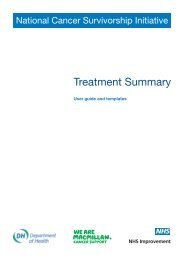
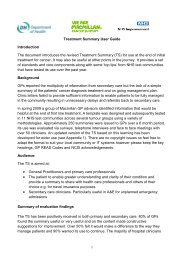
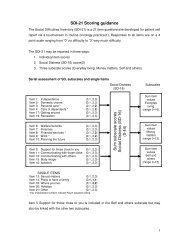

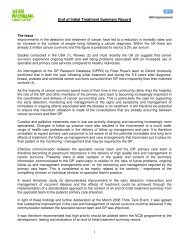
![Download the how to guide [PDF] - Macmillan Cancer Support](https://img.yumpu.com/47067428/1/184x260/download-the-how-to-guide-pdf-macmillan-cancer-support.jpg?quality=85)
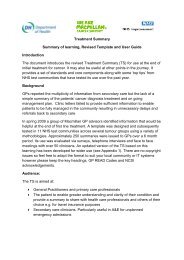

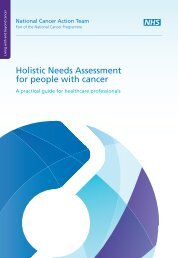
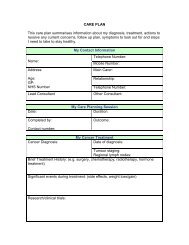

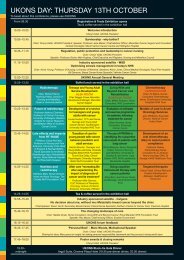
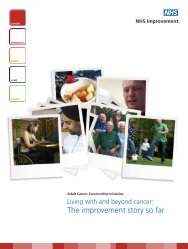
![HOPE Protocol [PDF, 420KB] - National Cancer Survivorship Initiative](https://img.yumpu.com/32566432/1/184x260/hope-protocol-pdf-420kb-national-cancer-survivorship-initiative.jpg?quality=85)